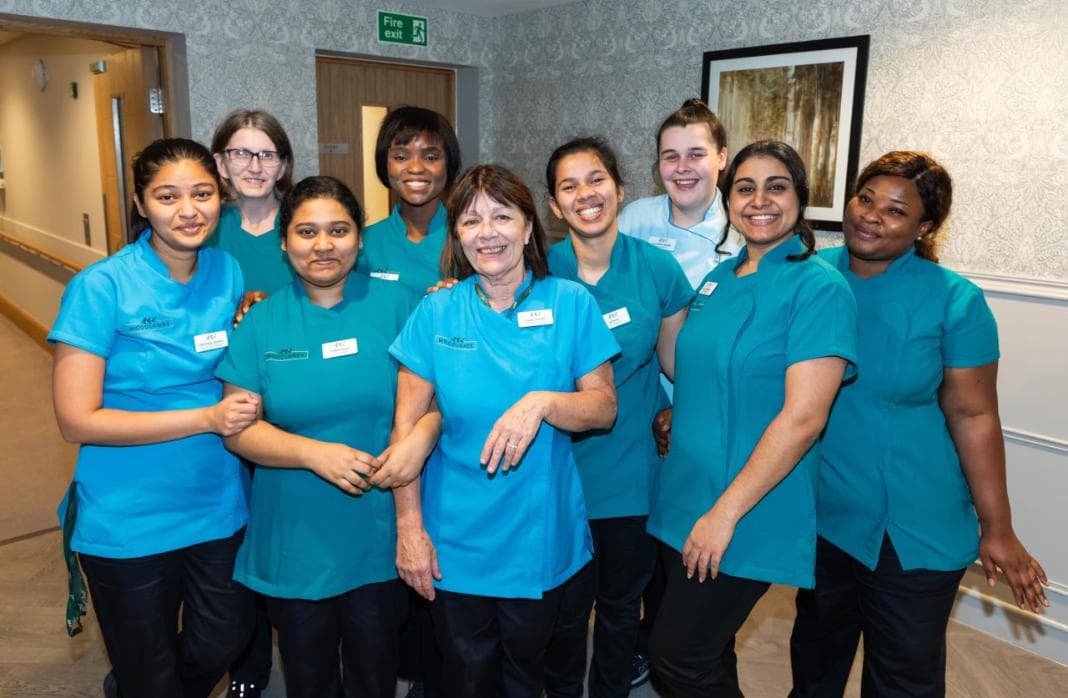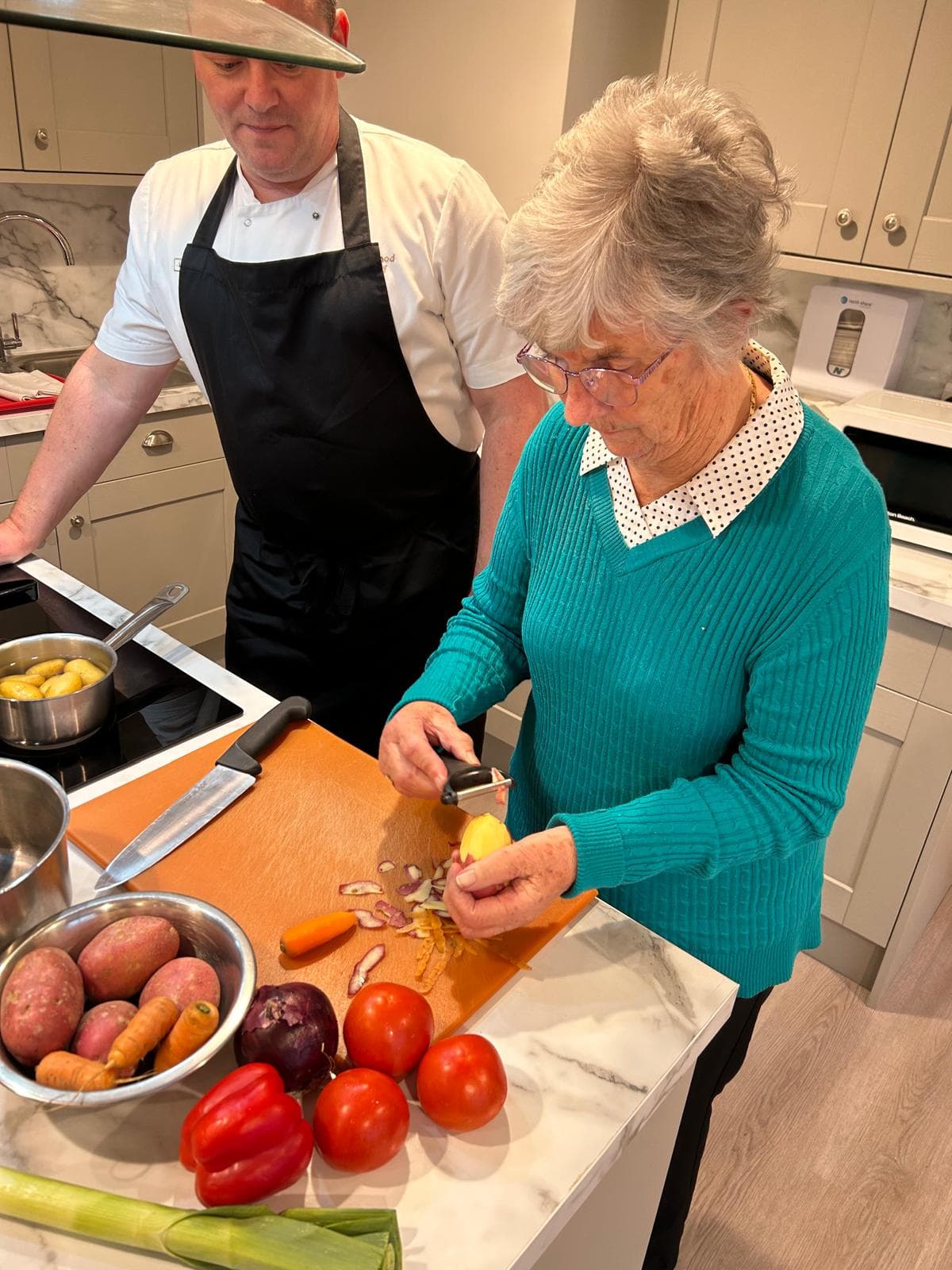The Importance Of Person-Centred Care Within a Residential Care Home in Aberdeen

Person-centered care prioritises the individual's choices and involvement in their care and support, ensuring they are always informed and can contribute to their own well-being. This type of care is extremely important when it comes to care planning, as it’s now recognised as a key driver of high quality care.
There are many benefits, including:
Flexibility - Individual’s are free to personalise their care to their own needs, preferences and requirements, instead of having a 'once size fits all' solution.
Responsibility - By allowing an individual to make their own care decisions, means they become more engaged and empowered.
Autonomy - Individuals who are responsible for their own health are therefore more incentivised to make better life choices, such as regular exercise and eating healthier.
Independence - By enhancing the quality of care individual’s receive, they then become less reliant on health care services, enabling to maintain their independence.
Happiness - Everyone receiving care most suited to them will feel happier, more confident and less anxious.
In this blog post, we will define person-centred care in a little more detail as well as providing examples, explaining why it’s important for health and social care.
What is Person-Centred Care?
Person-centred care is all about the health and care professionals seeing individuals all as equals, from planning, developing and monitoring care, in order to meet care standards. Person-centred care is all about considering someones values, social connections and lifestyle.
However, you might be thinking, what does person-centred care mean in practise? It’s all about being compassionate, taking into account someones point of view and working together to develop personalised solutions. This goes beyond sharing decisions, the aim is to transform the nature of the relationship between an individual and their carer. Likewise, when focusing on someones needs rather than their needs of the service, it drives a better outcome for service users as well as reducing the running costs.


Person-Centred Values
Person-centred values are guiding principles which shape a way that the service is delivered. By understanding and sticking to person-centred values, care staff are empowered to avoid processes to provide more personalised high quality care services suited to each individual needs.
So, how many values are there in which support person-centred care?
Individuality - Each person has their own identity, values, beliefs, choices and needs; a ‘one size fits all’ approach doesn’t work when it comes to providing care.
Choice - Every individual is empowered to make their own choices about their care and support; they should be given information that they understand to make sure their choices are informed, and for those unable to communicate, an alternative form of communication must be provided to ensure their voices are not neglected.
Independence - Most care homes in Aberdeenshire will ensure their residents remain as independent as possible; helping them do as much as they can for themselves, it doesn’t mean leaving people to cope alone, yet ensuring they have support whenever they need it.
Dignity - Everyone should be treated with dignity, taking into consideration their morals and ethical beliefs.
Respect - Everyone should be treated with respect, in a way that conveys their value as an individual, meaning they can have their own options and feelings, even if others disagree.
Rights - Everyone will be assured with the rights set out in the The Human Rights Act 1998. Including the right to life and to be kept safe from harm, the right to liberty, equality and security.
Privacy - Each individual is entitled to a private space and time whenever they may need it. Privacy is highly important in personal care, especially where personal hygiene or intimate procedures are involved. Access to personal information should only be granted on a need to know basis and they must have consent from the individual.
Partnership - Everyone, including an individuals family members, should be treated as partners when it comes to making decisions, especially about the care they receive. Great partnership which is successful is built on trust and good communication, which means listening to one another, valuing their perspectives.
The Person-Centred Approach
A person-centred approach means focusing on working in a partnership with the individual to design their care plan. Successful care planning means staff members are aware of what is most important to each individual, meaning they can act accordingly.
Person-centred care planning has the following features:
- Each individual is empowered to identify their strengths to make their own decisions, for example, wanting to use a walking frame around the home instead of their wheelchair.
- Personalised care plans are owned by the individual and written in first person, for example, “I would like to use a walking frame around the home instead of my wheelchair”.
- The personalised care plans are ‘needs led’ not ‘service led’, this means support is designed to fit an individual’s needs.
- Each individual has full support over their choices.



Examples of Person-Centred Care
Examples of person-centred care are used to show how individuals are empowered to make informed decisions about the risks which are involved within their treatment and care, helping them to contribute to their own safeguarding, minimising risks of negative, unfair or harmful treatments.
It’s important to avoid paternalism, this is where individuals feel dependency and feelings of helpfulness. Whereas, the focus should be more on a compassionate and holistic approach, starting from the perspective of an individual, rather than the caregiver.
Some examples of a person-centred approach…
- Ensuring people are physically comfortable & safe.
- Considering people’s preferences & chosen needs.
- Placing people’s values at the centre of care.
- Providing emotional support, involving friends & family members.
- Ensuring people have access to the care that they need, where & when they need it.
- Ensuring information is accessible, allowing people to make informed decisions about their care & support.
- Adjusting the time people go to bed, ensuring it’s best suited to them.
- Providing tools for people to perform everyday tasks, from seats in the shower to devices helping with putting on shoes.
- Giving people a choice of what to have for dinner.
- Not making decisions for people, but rather making decisions with them.



Principles of Person-Centred Care
The Health Foundation has formed four principles of person-centred care for caregivers and these principles are flexible, depending on the circumstances, needs and preferences of each individual. Additionally, as individual’s change over time and what is important to one, could be unnecessary or undesirable to another. So, what are the four principles?
1. Treat People with Dignity, Compassion & Respect
It’s known for most people to loose their independence when they go into a care home, so it’s important to remember that everyone has their own thoughts, feelings, needs and opinions. By respecting an individuals choice, empowers the individual to feel more in control, mentally and physically, which in turn, leads to the individual becoming more independent and creating better outcomes in their life.
2. Provide Coordinated Care, Support & Treatment
All care provided should be aligned and supported to services and care assistants must be coordinated - if not, care services can become disjointed. All care staff should be able to communicate clearly with one another, maintaining accurate care plans and medical records.
3. Offer Personalised care, Support & Treatment
As we all know, what works for someone, might not work for another, which is why by personalising services for each individual allows them to maintain their freedom, enabling them to fulfil their needs and wants.
4. Enable People to Recognise & Develop Their Strengths for an Independent Life
Individuals should be involved in decision making and care staff should encourage them to take actions to support themselves, meaning individuals become more in control and less dependent.
Person-Centred Practice at Woodlands Care Home
Woodlands Care Home in Aberdeenshire is located in the residential area of Craigiebuckler and within the heart of our home we provide outstanding care including Residential Care, Nursing Care, Dementia Care, Respite Care and Palliative Care all within a safe and secure environment.
Our home is designed to deliver a life of luxury alongside contemporary technology. With floor to ceiling windows, our home provides a sense of spaciousness and tranquility, inviting natural light into the home. Our home is all about providing a luxury lifestyle, alongside high standards of care, all within a close knit local community, creating an environment of emotional wellbeing, social engagement and a holistic enrichment.
We have a compassionate and dedicated team of care assistants and registered nurses who take immense pride in delivering customised and person-centred care, respecting the wishes of residents and loved ones. If an individual’s needs change over time, we can amend their care plan so the care provided is always accurate. Our main aim is to ensure our residents can keep doing what they love to do most, all within a safe and comfortable setting which supports their passions and interests.

For more information on our care home, the care we provide or anything else, please don’t hesitate to get in contact with us today - our friendly team would be happy to help and answer any questions that you may have.





